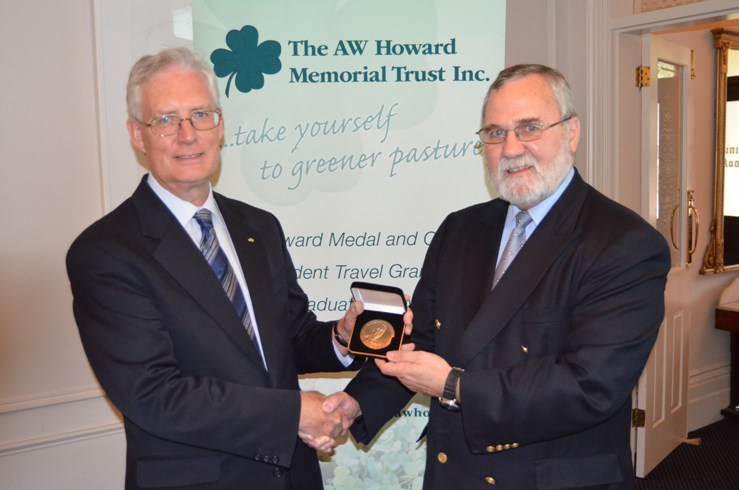CRCNPB Principal Scientist recognised with Howard Medal
The CRCNPB’s Principal Scientist, eminent entomologist Dr James Ridsdill-Smith, has been recognised for his achievements over 40 years in research on the behaviour, ecology and management of insect and arthropod pests of pasture plants by being awarded the inaugural AW Howard Medal and Oration.
Recognised for lifetime achievements and contributions to the Australian pasture industries, and the quality of his research and professional leadership Dr Ridsdill-Smith’s work led to better control of redlegged earth mites, of aphid pests of lupins, of ground-dwelling scarab beetles and grass grubs, and of pod-borers of chickpeas.
The AW Howard Memorial Trust Committee, and friends and colleagues associated with the Australian Pasture research community gathered for the historic presentation in the Victoria Room of the Edinburgh Hotel, Mitcham on Monday, 28 November.
Outgoing AW Howard Memorial Trust Committee chair, Professor Rob Lewis made the presentation to Dr Ridsdill-Smith who then delivered an Oration on his life’s work.
Dr Ridsdill-Smith described how, beginning with an early interest in natural history, he has endeavoured to combine modern theoretical and technological science with an observational and natural history approach during his 40 year career in entomology.
His approach to developing new strategies for the control of insect pests in pastures has been based on detailed biological and ecological research. Large numbers of insects are present in pastures. Some, like pasture scarabs and redlegged earth mite, are plant pests, while the bush fly is a dung-breeding pest. Others, like dung beetles and thynnine wasps, are beneficial insects. Pastures have a “carrying capacity” for insects as they do for livestock. Insects represent a “hidden force” in pastures, as loss of production from insect feeding is highest when pastures are growing well although at this stage damage may not be visible.
Dr Ridsdill-Smith described how research leading to detailed knowledge of the insect’s life-cycle was critical in understanding the effect of dung beetles on bush fly control, and in developing the TIMERITE spray programme to kill redlegged earth mite at the one time in the year when there were no eggs present. The complexity of insect communities in pasture systems makes them hard to study, and, using dung beetles as his model, Dr Ridsdill-Smith discussed how insect diversity might be used as an index of sustainable systems.
“Another approach to pest control is developing plant resistance, and pre-breeding research helped to develop screening methods and to identify mechanisms of resistance to various pests in sub-clovers, lupins and chickpeas. Collaboration with plant chemists through the Centre for Legumes in Mediterranean Agriculture (CLIMA) enabled the identification of a range of plant compounds which inhibited pest feeding,” Dr Ridsdill-Smith said.
“There have been many benefits from research into pest insects. Effective control of redlegged earth mite using TIMERITE provided very high production benefits to farmers, whereas the introduction of dung beetles has provided benefits to the wider community through the control of bush flies.”
However, Dr Ridsdill-Smith did point out that not all research succeeds in providing measurable benefits, and he gave several examples from his own research. He also acknowledged the support and collaboration he has enjoyed throughout his career from scientists in a wide range of disciplines.
Looking to the future, Dr Ridsdill-Smith expressed concern that more funding should be made available for ecological research to provide the detailed understanding of pest insects which is essential to deliver advances in pest control and to get closer to delivering optimum production in pastures.

Dr James Ridsdill-Smith being presented with the Howard Medal.

